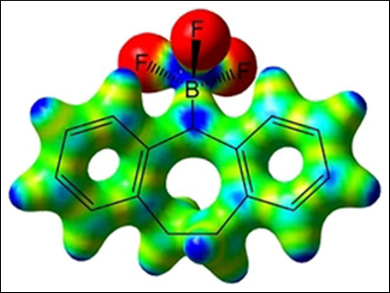Carbenes are important intermediates in many chemical reactions. Their reactivity is governed by their spin states—either singlet or triplet. There is a growing interest in systems capable of controlling the spin state of carbenes by intra- or intermolecular interactions.
Wolfram Sander and colleagues, Ruhr-University Bochum, Germany, have explored the intermolecular reactions of three arylcarbenes which have a triplet ground state with the Lewis acids H2O, ICF3, and BF3 using a matrix isolation technique. The carbenes were generated in their ground spin state at 3 K by photolysis of the corresponding diazo precursor in an argon matrix containing 1 % of the Lewis acid. At 3 K, the diffusion of species isolated in a solid argon matrix is inhibited. Thus, the matrix was annealed at 25–30 K for several minutes to allow the team to monitor the resultant bimolecular interaction by infrared (IR), UV/Vis, and electron paramagnetic resonance (EPR) spectroscopy.
The researchers found that the singlet states of some of the tested carbenes become accessible by interaction with the Lewis acids. The singlet states are much more stabilized by hydrogen bonding, halogen bonding, and Lewis acid–base interactions than the triplet states. The strength of the interaction varies depending on the carbene and the Lewis acid used. For example, the stabilization of singlet carbenes by halogen bonding with ICF3 is larger than the stabilization by hydrogen bonding with H2O.
- Reactions of Arylcarbenes with Lewis Acids,
Akshay Hemant Raut, Paolo Costa, Wolfram Sander,
Chem. Eur. J. 2018.
https://doi.org/10.1002/chem.201803695




